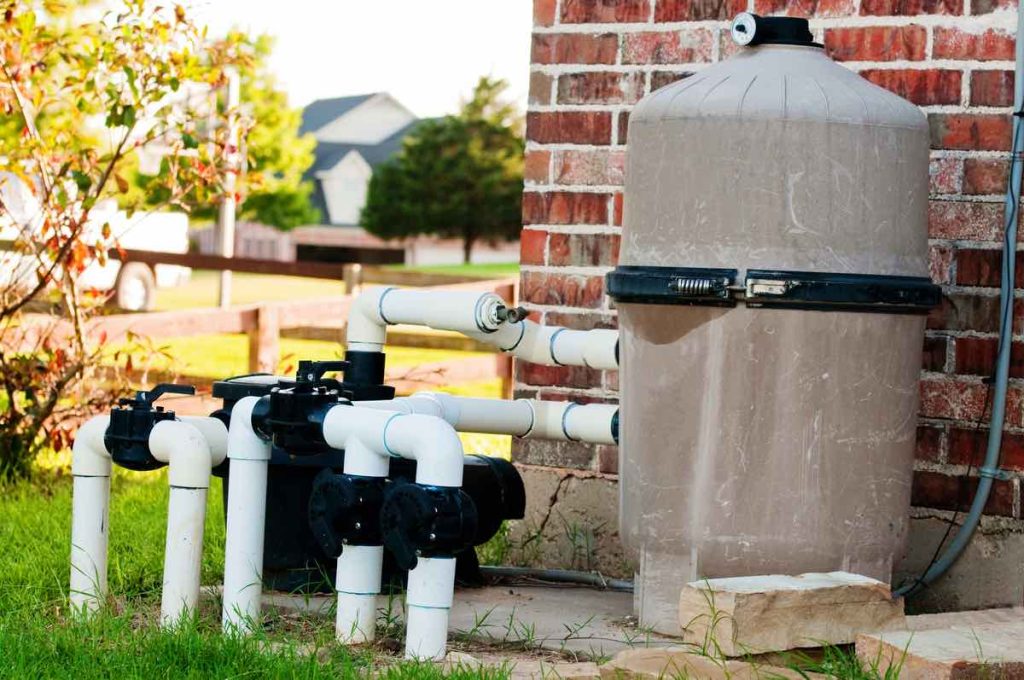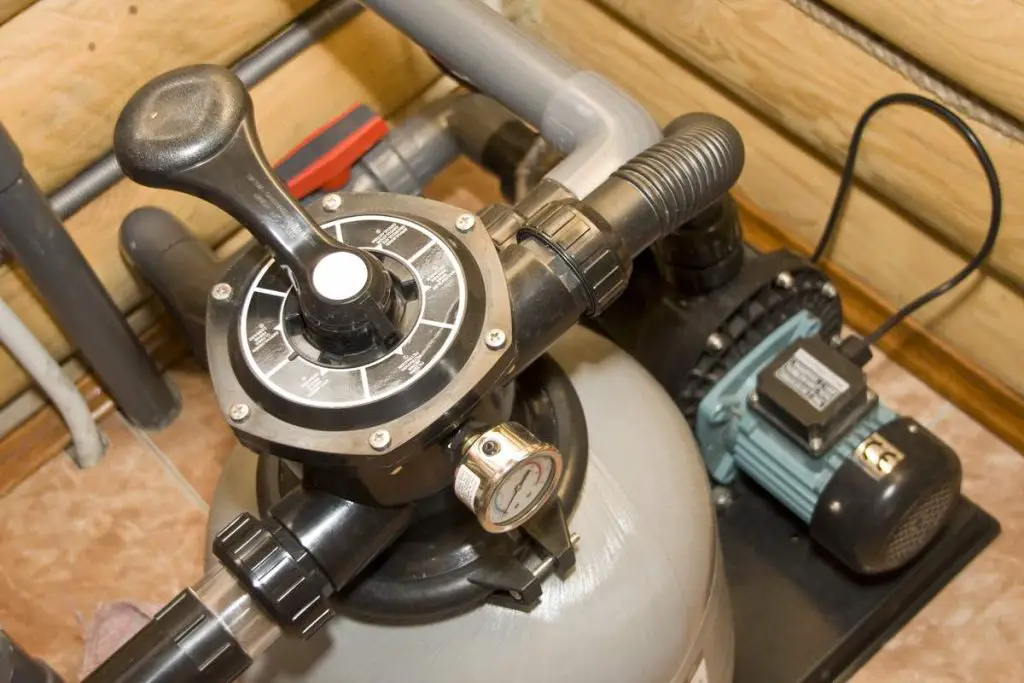For a pool heater to operate, the pump must circulate water through the heating unit. Many swimming pools have an automatic pump that turns on and off according to programmed periods.
The pool heater will not run if the pump is turned off. A pool heater only works when the pool control system is circulating water. When the circulation system is working, usually on a timer, the pool heater will raise the water temperature.
Whether you are designing a new pool or adding a pool water heater to your existing pool, having warm pool water when you want it is a wonderful luxury. Keep reading to learn how pool heaters work, the types of pool heaters in the market, and how to calculate the correct pool heater size.

How a Pool Heater Works
Sinking into warm pool water on a chilly day feels heavenly. If your pool has a water heating system, the heater will only be able to warm the water when it is circulating. The water must be moving for the heater to take water from the swimming pool and warm it in the heating tank.
There are three types of pool heaters in the market today that offer temperature regulation for your pool. Moderating the pool water temperature can be great for year-round swimming in warmer climates and taking the chill out of the water in colder climates.
Electric Pool Water Heaters
An electric pool water heater is the most common and works similarly to your home’s heat pump. The pool water heater operates in the following way to warm the pool water.
Here is how an electric pool water heater works step by step:
- The water heater pulls outside air into the heater unit.
- As the air passes over the evaporator coil in the heater unit, the refrigerant in the coil absorbs the warmth from the air.
- The liquid refrigerant changes to a gas.
- The warm gas passes through a compressor to increase the heat.
- The compressor transfers the heat to the water circulating through the heater unit.
- The heated water returns to the swimming pool.
- The process starts again as new water enters the pool heater unit.
Like your home’s heat pump that maintains a warm indoor temperature, many electric pool water heaters are energy efficient. They work best when outdoor temperatures exceed 45 °F (7 °C).
Gas Pool Water Heaters
When your home has natural gas available, using a gas pool water heater will warm the pool faster than any other heating method. Many gas water heaters will heat the pool water in a few hours, compared to a day or more for other pool water heating methods.
Here is how a gas pool water heater works:
- As the circulating water passes through the pool filter, it transfers to the gas water heater.
- The gas water heater burns in a combustion chamber.
- The heat from the chamber warms the pool water.
- The warmed pool water returns to the swimming pool.
A gas pool water heater will warm the water regardless of the outside temperature. This pool water heater is suitable for a pool that only needs heating periodically.
Solar Pool Water Heater
A solar pool water heater is the most environmentally-conscious and least costly heating method. Their low annual cost will help you save money when heating your swimming pool water.
Here is how a solar pool water heater works:
- The pool water travels through the filter to a solar collector.
- The solar collector is a solar panel that absorbs heat from the sun.
- The solar collector has multiple thin tubes where the water warms by the sun.
- The heated water returns to the pool.
- The solar collector refills to heat more pool water.
Some solar pool water heaters have sensors with an automatic valve that diverts the water to the solar collector when the temperature is higher than the pool water. As with any solar application, your pool site must receive sufficient regular sunlight to function properly.
A water heater can raise the temperature of your pool by about 15 degrees. However, the water exiting the heater should be hot enough to take the chill out of the water. You can learn more about the exact temperatures in my guide on the topic. [How Hot Should the Water Exiting a Pool Heater Be?]
Choosing the Correct Size of Pool Water Heater
Among the many decisions you must make for your pool design and features is whether to add a pool water heater. Sizing the pool heater to your pool ensures you have adequate warm water in the swimming pool without overworking the pool heater. Here is how to size a pool water heater for your pool.
- To calculate the pool surface area, multiply the pool width by the length (W x L). While some pool size calculators use the number of gallons to determine the heater size, a pool loses most of its heat from the surface. This is why you should calculate the pool surface to ensure enough BTUs.
- Divide the pool surface area by three (pool surface area / 3). The resulting number gives you the minimum BTUs you will need to heat the pool water.
- Think about the variables that affect the pool water temperature. Some factors that influence the pool water temperature are shade, annual rainfall, annual temperature averages, and sunshine.
Most pool installers recommend investing in a pool heater that measures one-third more BTUs than the calculations. In this case, bigger is better. Another factor to consider is that a swimming pool loses most of its heat at night, so having a pool cover will keep the water warmer for the next day.
Pool Heater Benefits
Adding a pool water heater to your swimming pool means the pool season does not have to end in August. In most places, the weather is still great long past Labor Day, so having a way to heat the water as the days grow cooler but are still pleasant will extend the pool time you can enjoy.

Conclusion
While a pool heater won’t run when the pump is turned off, it will work well when the water circulates through as the pump operates.
Having a pool water heater allows you to use your swimming pool earlier than when official summer begins and later into the fall. Depending on the average temperatures where you live, sometimes a pool heater will make the pool comfortable enough to use year-round.
